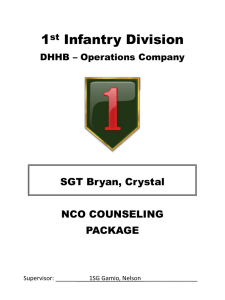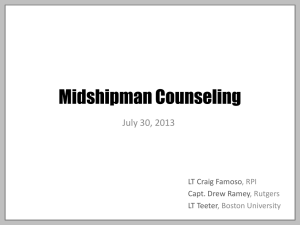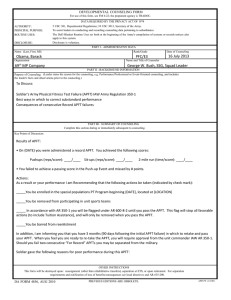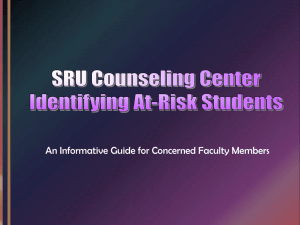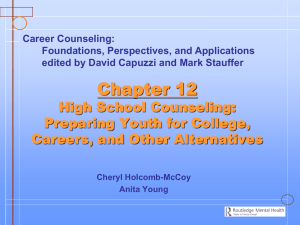file - Army Counseling Online
advertisement
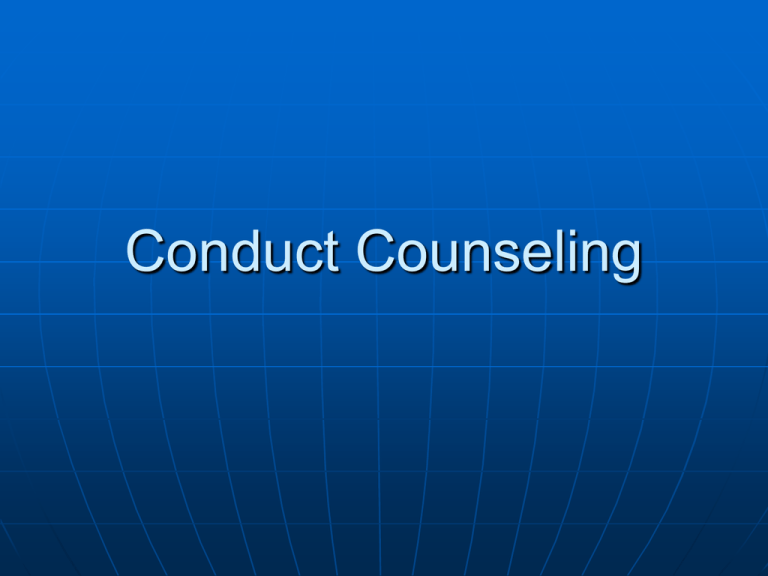
Conduct Counseling Objectives Given references, NonCommissioned Officers, and instruction in a class room environment, new NCOs will learn the fundamentals of counseling, some approaches to counseling, and relate these to different situations. References FM 22-100, Military Leadership FM 22-101, Leadership Counseling THE MENTOR 10th Ed by CSM Mark Gerecht (Ret.) The Counseling Form DA Form 4856 (Developmental Counseling Form) Types of Counselings Initial Monthly Promotion Disciplinary PLDC Family Care Plan Performance etc………… Approaches to Counseling Directive – Counselor led, most effective in dealing with Disciplinary problems and has short term effects. Non-Directive – Soldier-centered, takes responsibility for solving the problem. Takes longer and is more relaxed Combined – Most commonly used, a combination of both approaches. (13) Leader Actions In developing proper attitude and behavior, the leader should be aware of the characteristic aspects of effective counseling. These Include: Flexibility Respect Communication Support Motivation Purpose (LC, 12) Sources of Power Legitimate Power Reward Power Coercive Power Referent Power Expert Power -Soldiers will accept guidance and follow directions from a leader they believe knows the correct action or solution. This confidence is important in combat when soldiers must believe their leader is able to get them through dangerous situations. (LC,14) Forms of Influence Mapping Alternatives Recommending Persuading Urging Advising Commanding Punishing (LC,16) Before the session, don’t forget to…. Notify the soldier Ensure that the soldier knows the location and that the counseling does not interfere with any other requirements from senior leadership You may choose to inform the soldier of the purpose of the counseling. It is best to inform the soldier, to put his/her mind at ease. Schedule a time Inform the soldier of the time Choose a suitable place for counseling Select an environment free from interruptions (13,14) Before the session, don’t forget to…. Plan the discussion - Determine the points you wish to cover - Make notes on 3x5 cards - Do not get away from the issue, unless the subject requires immediate attention, or in some way is related to the issue at hand - Ensure you have appropriate documentation and references available - Identify the problem from the leader’s perspective - Try to understand the situation from the soldier’s point of view (13,14) Considerations when Counseling Conduct counselings at a time when it does not interfere with other activities Do not tolerate any breaches of integrity, in any form Never hold a grudge, it is unprofessional Never protect a soldier from discipline (14,15) Methods of Motivation Letters of Appreciation Certificates of Achievement Unit Certification Certificates Writing formal letter Distribute Key leader cards Recognize the FSG P.O.B. Recognize specific achievements (20) Corrective Training Remember: The punishment has to fit the crime!!! DO NOT confuse corrective training with extra duty-they are NOT the same Remedial training MAY be performed after duty hours (47) Remember…. Nobody is perfect, it will take time for you to get your own feel as a counselor It is important for us to remain professional as NCOs to give our soldiers 100% Never cheat your soldiers-going easy on your soldier makes no impact in the long run. This will only perhaps create an new NCO who does the same thing to his/her soldiers. And lastly…. A good counselor is always prepared End of Instruction Situations



